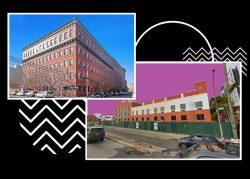UPDATED Feb. 27, 2022, 12:52 p.m.: Dozens of residents are in danger of losing their homes as a private equity firm looks to sell their units in some co-op buildings it acquired last year.
Glacier Equities is giving residents of the portfolio the option to buy their apartments or leave the buildings, The City reported. The owner is within its legal right to do so, as the buildings were converted to co-ops in the 1980s and aren’t rent-stabilized.
Myles Horn’s Glacier in 2020 acquired 255 apartments for $23 million by purchasing unsold shares across nine co-op buildings in the Bronx and Manhattan.
At the time, Glacier said it planned on renovating and selling the apartments. But the firm later sold two of the buildings — 85 McClellan and 2265 University Avenue — to Denali Management without commencing any eviction proceedings, according to a Glacier spokesperson.
The City reported that there are open eviction proceedings against at least 28 of the tenants. Glacier confirmed that number, adding that the vast majority of those tenants are far behind on rent. “Any tenant who is directly communicating and in active discussions with us about relocation or purchasing will not be evicted,” the spokesperson said.
Some tenants received 90-day non-renewal notices quickly after the portfolio sale. One received a notice six months after the purchase and residents at a building on Perry Avenue received 90-day notices one month after the sale, right before Christmas.
The Glacier spokesperson said, “We are more than willing to waive arrears to help with tenants’ relocation and will not be pursuing the payment of back rent upon vacate.”
Read more


The situation recalls last year’s face-off between private equity and tenants at 70 Prospect Park West in Park Slope, although that building is not a co-op so there is no purchase option for tenants.
In the Brooklyn case, real estate firm Greenbrook Partners bought the 30-unit building for $15 million before issuing 90-day notices for tenants to vacate. Those tenants began working with City Council member Brad Lander on options ranging from legal action to a campaign to get investors in the firm to pull funding.
After tenants, politicians, housing advocates and even an industry landlord group criticized Greenbrook’s tactics, Senate majority leader Charles Schumer joined New York lawmakers at an October rally, where some activists deemed the situation evidence of the need for a good cause eviction law.
Glacier’s warnings to tenants have renewed calls for “good cause” eviction protections, designed to give tenants in good standing the right to a lease renewal and capped rent increases.
“We would like to see good cause pass so that they can’t just decide to evict them because they want to sell these apartments,” said Jessica Bellinder, supervising attorney with the Legal Aid Society’s Bronx office. The Glacier spokesperson, however, noted that nearly all of the 28 tenants who received eviction notices would not be protected by “good cause” because they owe rent.
Local Council member Pierina Sánchez, who happens to own a co-op unit in one of the Glacier buildings, has accused the firm of “preying on disinvested neighborhoods,” although Glacier says its plan to upgrade the building is an investment in the area.
A spokesperson for Attorney General Letitia James expressed concern for the tenants on her behalf, encouraging the developer to find a resolution to the displacements.
This article has been updated with comments and information from Glacier.
[The City] — Holden Walter-Warner
